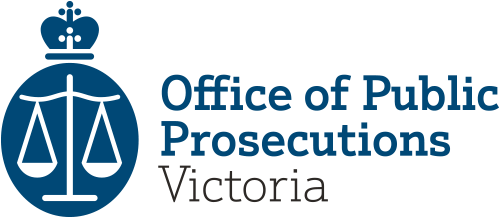Our role
We deliver high quality prosecutions independently, fairly and efficiently
The types of crimes the OPP prosecute
Some of the serious crimes (also known as indictable crimes) prosecuted by the OPP include:
- murder
- manslaughter
- sexual offences
- serious driving offences
- drug trafficking
- fraud
- serious assaults
- aggravated burglaries
- armed robberies
- occupational health and safety matters involving death or serious injury.
Less serious crimes (also known as summary crimes) are usually prosecuted by Victoria Police in the Magistrates’ Court of Victoria.
This video explains the role of the Office of Public Prosecutions.
Sexual offence cases make up a large proportion of the cases prosecuted by the OPP. This video has information about prosecuting historical sexual offence cases.
The OPP’s obligations towards victims of crime
The OPP conducts cases on behalf of the Director of Public Prosecutions who represents the Victorian community.
The OPP is not the lawyer for victims of crime or witnesses and does not represent victims and witnesses in court. This means that the OPP cannot:
- talk about all of the evidence with victims and witnesses
- influence the evidence of victims and witnesses or help them to fill gaps in their evidence
- take instructions from victims and witnesses about how the case should be run.
However, the OPP has obligations towards victims under the Victims’ Charter Act 2006.
For example, the OPP has obligations to:
- treat victims of crime with courtesy, respect and dignity
- provide certain information to victims about the progress of the case
- seek the views of victims before certain decisions are made
- provide reasons for certain decisions.
OPP solicitors and social workers from the Victims and Witness Assistance Service (VWAS) support victims of crime during the court process and refer victims to specialist agencies for further support where appropriate.
This video explains the relationship between the OPP and victims of crime.
After a case is referred to the OPP
The OPP prepares and conducts criminal cases on behalf of the Director of Public Prosecutions (DPP) including:
- committals in the Magistrates’ Court
- plea hearings and trials in the County Court and Supreme Court
- appeals in the County Court, Court of Appeal and High Court.
In certain cases, the OPP will also prosecute summary crimes, and finalise some indictable cases in the Magistrates’ Court.
The OPP prosecutes cases in Melbourne courts and in regional Victorian courts.
OPP solicitors prepare each case and seek instructions from Crown Prosecutors and the DPP about:
- whether a case can go ahead
- what the charges should be
- other important decisions such as whether to accept a plea of guilty or whether to appeal a sentence.
This video explains what might happen after a case is referred to the OPP.
This video explains what happens when the OPP receives a plea offer and how the OPP decides whether to accept a plea offer.
The prosecution test
A serious criminal case can only go ahead in court if it meets the prosecution test.
The prosecution test has two parts:
- There must be a reasonable prospect of conviction.
- The prosecution must be in the public interest.
You can find more information about the prosecution test and how other decisions are made in the Director’s Policy. The policy helps to ensure that prosecution decisions are made according to principled standards.
If a case does not meet the prosecution test, it must be discontinued. This video explains how decisions to discontinue a case are made.
The people who represent the DPP in court
The OPP briefs counsel to appear in court and present the case on behalf of the DPP. This could be a Crown Prosecutor, a private criminal barrister or an OPP solicitor advocate. They will represent the DPP in court for different hearings such as:
- bail applications
- committal hearings in the Magistrates’ Court
- plea hearings and sentence hearings in the County Court and Supreme Court
- trials in the County Court and Supreme Court
- appeals in the County Court, Court of Appeal and High Court.
There are many different words used to refer to the person who represents the DPP in court. You might hear this person referred to as:
- the prosecutor
- prosecution counsel
- the prosecution barrister
- counsel for the DPP
- Crown counsel
- the Crown Prosecutor or Senior Crown Prosecutor.
Other functions of the DPP
The DPP also:
- applies to the court to confiscate proceeds of crime
- brings breaches of certain types of orders before the courts
- provides advice to police and other agencies about charges
- contributes to law reform.
The OPP has different specialist areas that support the DPP to perform these functions. You can find the OPP’s organisational chart here.
